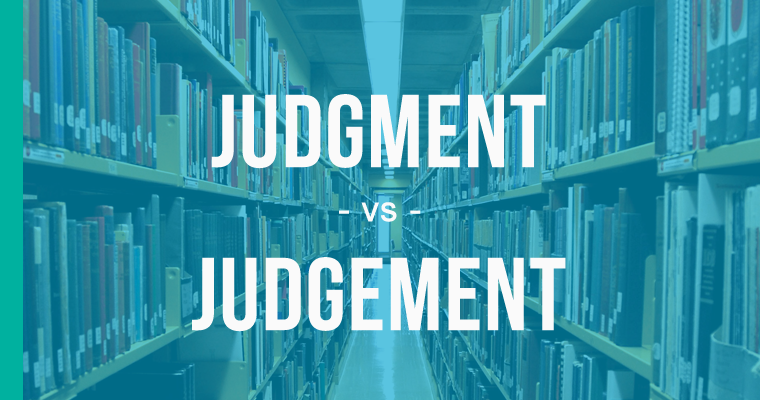Judgment vs Judgement – How to Use Each Correctly

What’s the Difference Between Judgment and Judgement?
Contents
Judgment and judgement are alternate spellings of the same word. They are both common in British English, although only one is acceptable in American English.
Judgment is a noun that means the decision of a judge or legal court or an opinion formed either objectively or subjectively. This is spelling is appropriate in both American English and British English. It is also the only acceptable spelling within American English.
- The judgment of the court is that the defendant is guilty.
Judgement has the same meaning, although it is considered an incorrect spelling in American English. This spelling is becoming more common in British English over time.
- I try not to make judgements about other people based on their clothes.
Let’s look at how to use these words in context.
Using Judgment in a Sentence
When to use judgment: Judgment is a noun that means an opinion or decision that one makes. This can be a legal judgment or a personal one.
For example:
- The prisoner was nervous about his trial date because the judgment regarding his guilt or innocence could go either way.
- Toddlers are famous for their bad judgment. They always make dangerous choices.
There are a few idioms and expressions that use judgment:
- a judgment call: a subjective opinion or decision
- The university president wasn’t sure whether or not to raise tuition. There were pros and cons to each choice. As there was no objective, correct choice, she had to make a judgment call.
- to do something against one’s better judgment: to do something even though one knows it is a bad decision
- I’m going to lend you more money against my better judgment. I know you never pay me back, but I really hope you will do so this time.
- to pass judgment: the action of making a judgment
- Please keep your opinions on my lifestyle choices to yourself. You have no right to pass judgment on how I live my life.
Some sources say that judgment is the preferred spelling for legal contexts in British English.
Using Judgement in a Sentence
When to use judgement: Judgement shares the same meaning and grammatical rules as judgment. The only difference is the spelling and the fact that judgement is an acceptable alternate spelling in British English, but not in American English.
For example:
- The jurors will deliver their judgement once they are through deliberating.
- Teachers must exercise careful judgement when deciding how to discipline students for plagiarism.
Judgement is growing in popularity, but judgment is still more common in British English. Therefore, it is best to use judgment.
Remembering Judgment vs. Judgement
The two alternate spellings have no significant differences in usage other than the fact that British English allows both spellings, while American English only allows judgment.
You can use the e in judgement to remind you of the E in England. This will help you to remember that only British English allows judgement.
Outside Examples
- Recognizing that such social prejudices are transitory, the courts have steadily moved away from accepting them as grounds for defamation judgments. –LA Times
- Tell her, “I’m telling you this because I would want to know.” Don’t pile on with judgment or any specific reaction, and leave it to this other parent to decide what to do about it, if anything. –Chicago Tribune
- She admitted that she probably could have used better judgement to avoid the scene: “To be honest, it probably was my fault. I’m not very good with distance, and I often get meters and miles mixed up.” –New York Post
- “It’s a spirit and way of life…not being afraid of stereotypes or judgement,” Joffredo said. “This generation [Millennials] connects better with authentic stories of success and lifestyles that are aspirational and attainable. There’s a big shift — we’re seeing in the women’s industry and it’s spreading. Perfection is not the key to beauty anymore.” –LA Times
Quiz: Judgment vs. Judgement
Instructions: Fill in the blank with the correct word, either judgment or judgement, in the correct form.
- No man should pass ____________ on another man. Only God should do that. (American English)
- Your son’s grade is right between an A and a B. It is up to the teacher’s ____________ to decide which grade he receives. (British English)
- Jurors must exercise wise ________________ when deciding whether a defendant is innocent or guilty by remaining as objective as possible. (American English)
See answers below.
Article Summary
Should I use judgment or judgement? Which of these two alternate spellings you use depends on where you are writing, or for whom you are writing.
- Judgment is a noun that means a decision or an opinion. Use this spelling for American English at all times, and for British English whenever you like.
- Judgement has the same meaning, but this spelling is incorrect in American English. It is okay to use in British English.
Because judgment is more common, and it is the only acceptable spelling in American English, it is best to stick to this version of the word’s spelling.
Answers
- judgment
- judgment or judgement (either is correct)
- judgment
